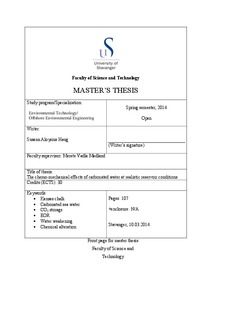| dc.contributor.author | Haug, Susann | |
| dc.date.accessioned | 2014-10-02T13:32:46Z | |
| dc.date.available | 2014-10-02T13:32:46Z | |
| dc.date.issued | 2014-03-19 | |
| dc.identifier.uri | http://hdl.handle.net/11250/222866 | |
| dc.description | Master's thesis in Environmental technology | nb_NO |
| dc.description.abstract | The possibility of CO2 capture coupled with sequestration in deep geological formation has emerged in attempt to reduce the significant increase of CO2 (g) in the atmosphere. The impact of CO2 on the reservoir integrity should be extensively investigated in order to predict the long-term effects of CO2 sequestration.
The solubility of chalk material is pH dependent. CO2 dissolved in sea water will react to form carbonic acid. Subsequently, bicarbonate is formed and the acidity is increased. Our initial hypothesis was that “flooding of carbonated water weakens the chalk and additional strains are expected”.
Three long-term flooding experiments performed on Kansas outcrop chalk has been analyzed in this thesis. All tests were performed at uni-axial strain conditions with some variations in test procedure for each experiment. We evaluate the sensitivity in the creep rate to the pore fluid composition, and we address the questions: Does the injection of sea water reduce the mechanical strength of compacted outcrop chalk at elevated stress and temperature? And to what degree will the injection of carbonated sea water further contribute to reduce the mechanical strength?
The results of our investigation were that the injection of carbonated water did not result in an increase of the creep strain rate in any of the three experiments during creep. The axial creep strain increased with 0.1, 0.4 and 0.5 % after the flooding with carbonated water was initiated which is not more than what was expected from the extrapolated creep curve before flooding. Based on our findings we conclude that under in-situ conditions CO2 dissolved in sea water does not increase the creep strain rate, but provides a small chemical driven additional strain. | nb_NO |
| dc.language.iso | eng | nb_NO |
| dc.publisher | University of Stavanger, Norway | nb_NO |
| dc.relation.ispartofseries | Masteroppgave/UIS-TN-IMN/2014; | |
| dc.subject | petroleum technology | nb_NO |
| dc.subject | reservoir technology | nb_NO |
| dc.subject | kansas chalk | nb_NO |
| dc.subject | carbonated sea water | nb_NO |
| dc.subject | CO2 storage | nb_NO |
| dc.subject | EOR | nb_NO |
| dc.subject | water weakening | nb_NO |
| dc.subject | chemical alteration | nb_NO |
| dc.subject | teknisk miljøvern | nb_NO |
| dc.title | The chemo-mechanical effects of carbonated water at realistic reservoir conditions | nb_NO |
| dc.type | Master thesis | nb_NO |
| dc.subject.nsi | VDP::Technology: 500::Environmental engineering: 610 | nb_NO |
